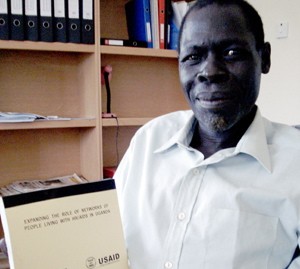
Dickens Alyao is no stranger to the fear and uncertainty associated with HIV. Ten years ago, he tested positive for HIV while on active duty in the military. Today, at 46, Alyao is the father of six children (all of whom are HIV negative) and an active USAID-trained network support agent in his home community of Aloi, Lira district.
USAID’s Northern Uganda Malaria, AIDS, and TB program (NUMAT), works to strengthen linkages between health clinics and communities by training network support agents like Alyao, who are often living with HIV or AIDS. Network support agents are trained to raise community awareness and support people through testing, diagnosis, treatment, and follow-up care in their communities.
“I came back to Lira in 2004 and organized a small support group for 27 HIV positive people. But this was before NUMAT, and we could only advise people about living with HIV,” said Alyao.
“There were no drugs [for treatment], and no health services available in Lira. Now, people can be tested and drugs are available. When people started coming back after the confl ict stopped in 2006, we knew we had to tell the community about HIV and we were very happy that USAID could support us. Today, there are 669 members in our network and, in our health unit, there are 1,100 people receiving HIV treatment.
“Because of USAID, we are well trained in counseling and referrals, and people trust us. When we speak to communities, we introduce ourselves as people living with HIV, we tell them why it is important to get tested, that there is treatment available, and tell them how we are living positively with HIV. When they come to the health facility, we are there and that makes them feel comfortable. We counsel them about the test and about the drugs. Female network support agents speak to pregnant women about prevention-of-mother-to-child transmission, side-by-side with health workers. If we need to, we see them in their homes.
“Life is still very difficult, but we are very grateful for the health services. I am very happy that I am making a difference for other people who, like me, are living with HIV. I expect to live another 40 years and I will keep working for my community as long as I can.”







Comment
Make a general inquiry or suggest an improvement.